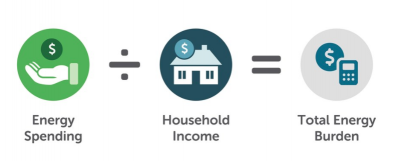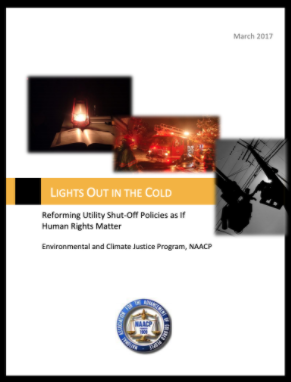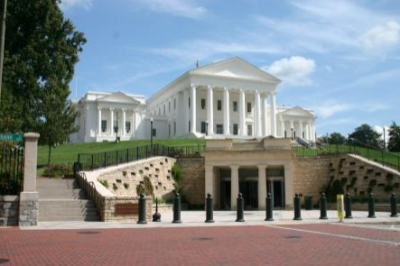Front Porch Blog
Urgent action needed in Virginia! Contact your state lawmaker today!
Water and energy services are fundamental to human health and development, and access to each enables full participation in the education, social and economic opportunities that underpin the functioning of modern society. Availability of clean water and energy for heating and cooling also contributes vitally to the maintenance of public health, including to physical and mental well-being. However, the Covid-19 pandemic has drawn attention to the critical problem of access to these services, an issue that carries dimensions of both equity and public health.
A standing crisis – made worse
Utility affordability has been a significant and pervasive problem throughout the country as tens of millions of households struggled with being able to afford their water and energy bills — even before the Covid-19 pandemic. Now, additional households which were previously able to manage their bills have felt the economic reverberations of Covid-19, and access to water and energy services has become tenuous for some, and impossible for others. As are many public policy problems posed by the pandemic, the problem of access to utility services for water, gas and electricity is complex, compounded by existing inequalities and exacerbated by new stressors.
This crisis is about to erupt on an even broader scale as moratoria on utility shutoffs across the Southeast that were enacted in the early phases of the pandemic start to expire. North Carolina households that purchase power from rural electric cooperatives and municipal utilities became vulnerable to utility shutoffs July 31, while those served by Duke Energy Progress or Duke Energy Carolinas will face the same risk starting September 1.
Households served by regulated utilities in Virginia and Tennessee will follow suit at the end of August. Meanwhile, customers of unregulated utilities like municipal utilities in Virginia, and customers of electric cooperatives in Tennessee have been subject to the decisions of town councils and utility managers who have, in many cases, resumed or implemented shutoffs after an initial stay of such drastic measures. Many never implemented a moratorium at all.

Graphic by Efficiency Vermont
Regardless of how households seek to cope with energy burdens, negative health outcomes, heightened anxiety and vulnerability to loss of other services during economic shocks are likely to result. The Coronavirus pandemic has induced just that type of economic shock to households over a range of income levels. Many people have suffered reduced incomes from changes to their employment status, whether due to the loss of a job or reduced hours. Worsening the problem, household energy consumption has increased in the meantime, as people are spending more time at home to avoid the virus. People who formerly relied on workplaces or local public spaces to stay cool during heat waves are now unable to access those spaces due to shut-downs and social distancing requirements. And these problems are just the tip of the iceberg.
Long before Covid-19, state and federal programs were established to help vulnerable households avoid utility shutoffs. These include the federal Weatherization Assistance Program and the Low Income Home Energy Assistance Program (LIHEAP). Yet, these programs are typically underfunded and households in need in some areas are diverted to waiting lists.
“The Low-Income Home Energy Assistance Program (LIHEAP) provides low-income residents with … a variety of ways to save energy and increase efficiency, such as insulation, roof replacement, weather stripping, window/door sealing and repair/replacement of the current heating systems. There is a waiting list for assistance.” – Solutions That Empower People, Inc., a community action agency in Franklin and Patrick counties in Virginia
Some programs place limits on how often a household can apply for utility bill assistance, others on the amount of total assistance available to a particular applicant. And in many cases, these programs are poorly advertised, so that many households who need utility bill assistance simply aren’t aware that they qualify. Often, nonprofit organizations, churches and other agencies will step in to assist households threatened by the loss of water and electricity, yet in today’s economic situation, these entities are struggling for funds themselves. Worse, in Virginia and North Carolina, some towns have directed their allotments under the CARES Act (the stimulus package passed by Congress in March) to businesses, not struggling households.
As a result of the economic blows wrought by Covid-19, utilities are now facing massive amounts of debt from unpaid bills. In North Carolina, for example, 1.4 million households amassed $218 million in utility debts between April 1 and June 30 alone. The scale of the utility debt crisis imposed by the pandemic surpasses the ability of existing public and private programs to meet the need for assistance from burdened households and from cash-strapped small utilities. In particular, smaller utilities and municipal utilities that are prohibited from taking on debt are struggling to account for losses in revenue. In lieu of such aid, impacted households are expected to shoulder the burden of the economic crisis; yet, regulated investor-owned utilities should not be exempted from the impacts of the greatest economic recession since the Great Depression, and unregulated publicly owned utilities should serve the public interest as they are supposed to. Meanwhile, elected officials should prioritize the needs of households rather than agency budgets and allocate the funding necessary to stem the crisis households are facing.
The crisis at hand: What should be done now?
Appalachian Voices has worked since 2013 to address rural, low-income energy burdens by advocating for inclusive home energy efficiency finance programs through rural electric cooperatives in Tennessee and North Carolina, and has been an advocate for low-income energy solutions more broadly. Since the onset of the pandemic in March, we have been working tirelessly to ensure that households — particularly low-income households that struggle with being able to afford their utility bills even in normal times — have been protected from losing vital utility services due to not being able to pay their bills.
We have accomplished this by working with key partners to advance shutoff moratoria in both North Carolina and Virginia and sharing the stories of those who have been impacted by the lack of a moratorium in Tennessee. With the existing moratoria having ended or approaching their end in those states, and the dire need to immediately address ongoing and looming service disconnections across all three states, we strongly urge both utilities and elected officials to adopt and implement the following recommendations as they develop solutions to the shutoff crisis.In the short-term, states should heed the following criteria: prioritize people; establish humane and reasonable repayment plans; forgive past-due bills (arrearages) when coupled with successful payment of future bills; establish shutoff exemptions; and establish requirements for utilities to adhere to when shutoffs occur.
Prioritize people State, federal and utility funding should be designated first and foremost to specifically cover past-due balances for residential utility customers in crisis, particularly where utilities themselves are struggling to absorb arrearages. This should take priority over balancing state or local budgets. For example, a portion of funds from the CARES Act, the HEROES Act or a utility’s general funds must be set aside to assist residential customers who have incurred utility services debt as a result of Covid-19.
Establish humane and reasonable repayment plans It is expected that states will continue to enforce social distancing regulations while conducting phased re-openings, which will continue to affect the ability of many households to earn income and afford their utility bills. However, utility debt repayment plans should be established that cap debt repayment charges at no more than 10% of future bills. For example, if the first post-moratorium bill for a particular household is $200, the debt repayment charge cannot exceed $20, resulting in a total bill of $220. This will alleviate the burden of additional charges on future bills for households that have already been struggling to, or have been unable to afford their utility bills during the pandemic. No time period should be set for how long a customer has to repay the total debt. However, if a time-based repayment plan is selected, the required repayment period should be no less than 12 months, but ideally for 18-24 months.
Couple arrearage forgiveness with successful payment of future utility bills In cases where utilities, particularly investor-owned utilities, find it prudent and beneficial for both the utility and the customer to forgive accumulated arrearages incurred since and/or prior to the onset of the Covid-19 pandemic in exchange for successful payment of utility bills moving forward, such programs should be established, and utility regulators should establish guidelines for the implementation of these arrearage-forgiveness programs.
Establish shutoff exemptions for vulnerable households In no instance should shutoffs occur for low-income households (those earning 200% of the Federal Poverty Level or less) with children under 18, seniors over 65 or for those with disabilities, a Covid-19 diagnosis or cardiovascular or respiratory health concerns. Additionally, temperature thresholds should be set so that no household utilities are disconnected at, above or below specified temperatures. Many states have a “cold weather” rule such that services are not disconnected at or below 32° F; we recommend that the same rule be employed by Tennessee, North Carolina and Virginia.  Additionally, upper temperature thresholds should be established, according to guidelines set by both the NAACP and modeled in other states, whereby utility shutoffs are prohibited when a heat advisory issued by the National Weather Service is in effect. Furthermore, households already receiving both federal and state assistance should be exempted from shutoffs, as should households where annual income is below 200% of the established Federal Poverty Level threshold or 80% of Area Median Income.
Additionally, upper temperature thresholds should be established, according to guidelines set by both the NAACP and modeled in other states, whereby utility shutoffs are prohibited when a heat advisory issued by the National Weather Service is in effect. Furthermore, households already receiving both federal and state assistance should be exempted from shutoffs, as should households where annual income is below 200% of the established Federal Poverty Level threshold or 80% of Area Median Income.
Establish shutoff requirements For households that do not meet the above shutoff exemption standards and when state or federal Executive Orders imposing moratoria on shutoffs are not in effect, require that utilities provide no less than 21-day notice to a household prior to stopping water or energy services to that household. No services may be shut off for arrearages which have accrued over fewer than 90 days. Furthermore, require utilities to allow customers to provide self-verified notice of their exempted status through a standardized process that is minimally burdensome and accessible to both English and Spanish speakers.
Beyond the pandemic: What’s next?
While the steps above can bring urgently needed relief to families during the near-term Covid-19 and economic crises, a long-term solution that addresses inherent instabilities and inequities within the current utility systems remains urgently necessary. Payment plans that alleviate energy burdens; arrearage management programs; inclusive financing for energy efficiency upgrades that targets low-income, Black and disadvantaged communities; and increased weatherization and LIHEAP funding can expand the ability of North Carolina, Tennessee, Virginia and other states to ensure access to clean water and energy services for all.
 Furthermore, Appalachian Voices encourages utilities, policymakers and advocates to fundamentally remake the system itself. The current model relies on an inhumane, pay-to-play scenario, where people can either afford – and therefore access – clean water and essential energy services, or they can’t. The Covid-19 pandemic has laid bare the cruel injustice of this system, highlighting inequities inherent within its structure and revealing the limited fail-safes for families previously able to afford clean water and energy. A limited set of public, private and nongovernmental programs cannot absorb the weight of millions of additional households seeking access to water or critical energy services; these programs couldn’t absorb the scale of preexisting need prior to March 2020.
Furthermore, Appalachian Voices encourages utilities, policymakers and advocates to fundamentally remake the system itself. The current model relies on an inhumane, pay-to-play scenario, where people can either afford – and therefore access – clean water and essential energy services, or they can’t. The Covid-19 pandemic has laid bare the cruel injustice of this system, highlighting inequities inherent within its structure and revealing the limited fail-safes for families previously able to afford clean water and energy. A limited set of public, private and nongovernmental programs cannot absorb the weight of millions of additional households seeking access to water or critical energy services; these programs couldn’t absorb the scale of preexisting need prior to March 2020.
In 1976, the United Nations incorporated economic, social and cultural rights into its framework of universal human rights, specifically naming “the right to social protection, to an adequate standard of living and to the highest attainable standards of physical and mental well-being” among them. In the United States today, where educational, social and economic opportunities revolve around modern technologies that rely upon energy resources, it has become increasingly clear that access to energy services is a gateway to these standards of living and well-being. In order to attain these ideals, a principled and far-reaching transformation of our existing, outdated utility services model is necessary. Equitable access to utility services should be secured through expanded participation in energy generation, including through an increase in distributed generation in low-income, Black, frontline and other vulnerable communities. Impacted communities should be centered in decision-making over where and how energy is produced according to an energy justice framework.
Ultimately, an energy system that places people, rather than profits, at the center of its functioning should be sought.
PREVIOUS
NEXT
Related News

Leave a comment
Your email address will not be published. Required fields are marked *



Leave a Comment